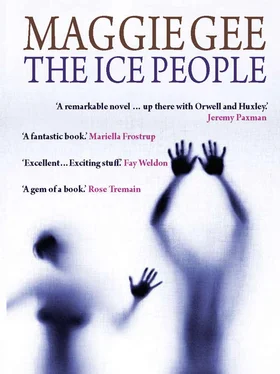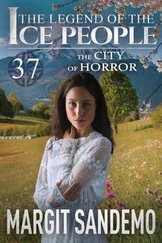Maggie Gee - The Ice People
Здесь есть возможность читать онлайн «Maggie Gee - The Ice People» весь текст электронной книги совершенно бесплатно (целиком полную версию без сокращений). В некоторых случаях можно слушать аудио, скачать через торрент в формате fb2 и присутствует краткое содержание. Год выпуска: 2008, Издательство: Telegram Books, Жанр: Фантастика и фэнтези, на английском языке. Описание произведения, (предисловие) а так же отзывы посетителей доступны на портале библиотеки ЛибКат.
- Название:The Ice People
- Автор:
- Издательство:Telegram Books
- Жанр:
- Год:2008
- ISBN:нет данных
- Рейтинг книги:4 / 5. Голосов: 1
-
Избранное:Добавить в избранное
- Отзывы:
-
Ваша оценка:
- 80
- 1
- 2
- 3
- 4
- 5
The Ice People: краткое содержание, описание и аннотация
Предлагаем к чтению аннотацию, описание, краткое содержание или предисловие (зависит от того, что написал сам автор книги «The Ice People»). Если вы не нашли необходимую информацию о книге — напишите в комментариях, мы постараемся отыскать её.
imagines an ice age enveloping the Northern Hemisphere. It is Africa’s relative warmth that offers a last hope to northerly survivors. As relationships between men and women break down, the novel charts one man’s struggle to save his alienated son and bring him to the south and to salvation.
Maggie Gee
The White Family
The Flood
The Ice People — читать онлайн бесплатно полную книгу (весь текст) целиком
Ниже представлен текст книги, разбитый по страницам. Система сохранения места последней прочитанной страницы, позволяет с удобством читать онлайн бесплатно книгу «The Ice People», без необходимости каждый раз заново искать на чём Вы остановились. Поставьте закладку, и сможете в любой момент перейти на страницу, на которой закончили чтение.
Интервал:
Закладка:
Wicca were in an awkward position, having set their face against techfixes. So instead they asked people ‘not to overreact’ — but how could we overreact to an ice age? They reminded us there had been climate fluctuations in the past that had not resulted in an ice age. Then they pointed out that human beings had survived the last ice age. They harked back to the wars of the last century, and reminded us how people had stuck together — and yet they had done their best to divide us. They asked for patience; donations; calm. They suggested that we needed a mammoth new tax to give ‘communal support’ in the face of the ice — which they also assured us would not be coming. Two decades, they said, was plenty of time, and yet the Speakers were talking too fast. And Sarah herself had gone very low profile, which suggested she wasn’t happy with all this.
I realised quite soon that we didn’t have two decades. The original paper had been measuring time from the first slight cooling to maximum cold. But the process was already well advanced. I remembered the steamy, sticky evening in the little room where we had lived first, before Luke was born, before we quarrelled, that normalseeming evening when I found the first queer report of the icesheets thickening, and mentioned it to Sarah, and she didn’t understand — how could should she have done? I didn’t myself. We had so many other things on our minds, we were sweet young lovers, trying to make babies –
Blindly, blindly through life’s night. Missing the landmarks. Missing the stars.
Now at last I see the importance of the stars, as the sun climbs up with that effortless strength above our wasted black horizon. Burning bright, unbearable. Its massive power, so far away, shooting across a million kilometres of icy space to touch my fingers, so early in the morning that I can’t feel the warmth, but I watch two fingertips slowly change from frozen yellow to pinkish grey, under the black arcs of my fingernails.
We took the sun for granted, when it was too hot. We began to resent it, it crowded us, but now the ice is all around I start to see it as our god, the blazing face behind the names, God the Father, Buddha, Jesus … Wasn’t it the heat of the sun that made us? Gave us life? Gave us breath?
And then a distance came between us.
*
In fact, we were almost halfway towards the ice by the time the public kerfuffle started. I think it was 2056. Halfway through the century, as well. I was halfway through my life, at fiftyone, yet I began to feel as though it were over. I’d lost my wife, I’d lost my family, and now we were losing all the things we were used to, so familiar we hardly noticed them, hot summer nights, orchids, fruit trees …
Actually my life had hardly started. I wish I had known that at the time.
The little peach tree on our balcony frosted. I took it in, but it was too late.
Too late to do so many things that we suddenly realised ought to be done. Ever since the state had withered away, nearly fifty years ago at the turn of the century, we’d depended on private contracts for services, some individual — hospitals, learning centres — others bought en bloc through our district councils — waste disposal, electricity, gas. Most luxury developments had costlier contracts providing a higher level of service, like London’s Northwest Enclaves, for example, where the elite once liked to live –
(It used to look wonderful in spring. Pink villas floating on a sea of pale blossom, and the guards in shirts with goldbraided epaulettes. Children were allowed to play in the streets. It’s gutted now, blackened, wrecked.)
Our lives — the lives of the people in work, the people in houses, the Insiders — were a muddle of layered networks of contracts, half of which no longer functioned, since firms were always going out of business. (In a sense life is so much simpler now. Harsher, bloodier, but simpler.) And then there were the homeless — Outsiders, Wanderers, the urban homeless and their rural cousins, who had no contracts, no services, depending on each other, mostly, making their own piecemeal arrangements. Our society was an amorphous pyramid, with the Speakers perched precariously on top, then the relatively successful people, who had jobs and houses and educations and elected the Speakers and contributed to Comtax and paid their district council to keep order. Underneath them were the Outsiders and Wanderers, a great stirring, floating base of people with nothing. The Speakers pretended to address everybody on their weekly show, inserting carefully respectful references to ‘fluid lifestyles’ to placate the Wanderers, but in fact, what did they have to say to us? For decades politicians had been figureheads, with no money to spend and few legislative powers other than a veto on Euro laws. They vetoed most of them on principle, and Euro didn’t care. We were slowly dropping off it, like a tiedoff limb as the blood supply withered.
Now suddenly we needed leaders. We needed something to hold us together. We needed people to take decisions. We needed someone like Winston Churchill, that great British leader from the last century. But all we had got was Wicca World. We needed somebody to save us from the ice. To save everyone from the same disaster, after years of lip service to ‘different needs’. We needed decisions about energy, we needed spending on climate studies, we needed decisions about food management, heat conservation, public order … We needed decisions about healthcare. Who would care for the Outsiders? They had no homes, they would get sick first, with nothing to protect them from the cold. If they got sick, we would be infected. Or perhaps they would want to take our homes. We started to realise uneasily that maybe we might need a centralised policeforce. Maybe we would need an army.
We began to see that life would get rough. Fear began to push people together. And fear began to tear people apart.
Fear is also a source of power, and Wicca World exploited it. Because people were afraid of the Doves as well, and that was more immediate, more direct than their misty, epic fear of the ice. And so Wicca ranted against the Doves. More incidents were being reported all the time of what the screens began to call ‘grazing’ — attacks on living things by Doves, all of them third-or fourthgeneration replicants. Wicca made sure that weeping mothers appeared on the screens with them when they spoke, which helped rally public opinion behind them. I remember one child whose sleeping cat had been eaten, roundfaced, snubnosed, with ginger hair and blue eyes like saucers that filled with tears when she remembered little Tiggs. Marilyn was a propaganda triumph. After she had finished the Speakers came on to promise us that they would ‘save us from the Doves’, shield our children from ‘robot perverts’.
So babyeating robots were a Bad Thing? Well, no one was going to disagree with that. It was all so much simpler than dealing with the ice, and the ice kept coming, slowly, faster; villages in Norway were cut off by the snow, settlements began to be abandoned. A team of scientists taking measurements in the Arctic lost radio contact and disappeared.
Wicca had no statutory powers to make laws, but they could petition the Eurocourt or instruct our own courts to appoint a commission. They announced they were drafting legislation applying to all future robot manufacture. No robot could be fuelled by organic matter or attempt problemsolving through random mutation. But the legal process was very slow. Direct action was easier.
Juno herself appeared on screen, looking heavier, firmer, sadder than before, speaking with the voice of an immensely wise mother (though I happened to know she had never been a mother), and told us that we had a choice to make, between human children and the Doves who were ‘stealing the babies and corrupting the fathers’. She cited the ‘disgusting’ Sexbots as evidence, though they hadn’t caught on with the public at all, since their orifices weren’t that pleasurable or comfortable or even readily cleanable — (How do I know that? No, truly, I only know because the lads had told me. We talked about every kind of mobot at the club, and maybe some of those men were ‘perverted’, but that can be a name for loneliness.) I’m afraid I still thought the name ‘Sexbots’ amusing, particularly when Juno pronounced it with a particularly scornful intonation, looking down her nose like a cow with a cold and spitting out the S’s like manure-covered straw … but the women of Britain were not amused.
Читать дальшеИнтервал:
Закладка:
Похожие книги на «The Ice People»
Представляем Вашему вниманию похожие книги на «The Ice People» списком для выбора. Мы отобрали схожую по названию и смыслу литературу в надежде предоставить читателям больше вариантов отыскать новые, интересные, ещё непрочитанные произведения.
Обсуждение, отзывы о книге «The Ice People» и просто собственные мнения читателей. Оставьте ваши комментарии, напишите, что Вы думаете о произведении, его смысле или главных героях. Укажите что конкретно понравилось, а что нет, и почему Вы так считаете.












